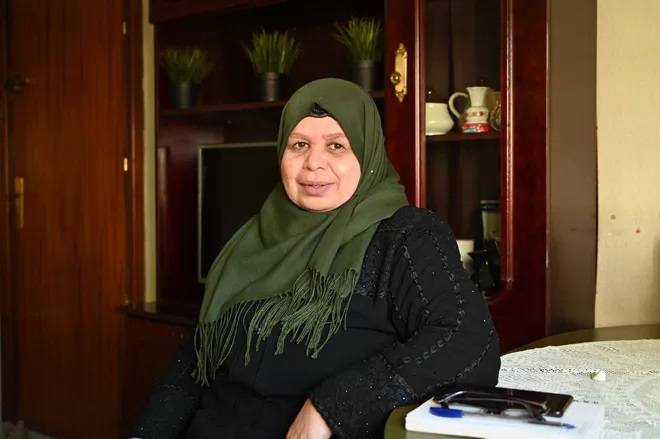It’s February and NewsSpectrum is moving forward full steam! We’re excited to watch as more minority- and majority-language media partnerships across Europe publish their stories.
In Spain, the bilingual Arabic-Spanish news website Baynana, led by a team of refugee journalists from Syria, teamed up with La Marea to publish a new series of reports on the reality of Syrian refugees in Spain.
The coverage consisted of four reports, published in both Arabic and Spanish, focused on different aspects that affect Syrian refugees in Spain, such as access to work and housing, the discrimination they face or the need to seek refuge a second time – when they are forced to come back to Spain from third countries. The series also tells some success stories of refugees who made a living and started a new life.
La semana pasada lanzamos con @LaMarea_com un ‘Especial Siria’, queriendo contar la realidad de refugiados siros en España. Esta serie de reportajes ha sido posible gracias a la colaboración entre Baynana y @LaMarea_com y al apoyo de NewsSpectrum y @GlobalFreeMedia. pic.twitter.com/QeuMcOA7qX
— Baynana (@baynanaes) February 3, 2022
NewsSpectrum also supports investigative journalism on minority-related topics. And in a new report, the German newspaper Taz joined forces with the Germany-based, Turkish-language news outlet Artı Gerçek to locate the sources of online threats against people of Turkish and Kurdish background in Germany, including politicians and activists.
Journalists Volkan Ağar, Nora Belghaus, and Ali Çelikkan traced the threats to the owner of a mobile phone shop in Turkey, a self-professed follower of Turkey’s far-right nationalist Grey Wolves.
Their interview with the shop owner is revealing and disturbing. As the journalists write, “He says that the German government can’t protect his victims. The fact that he doesn’t even hide behind fake profiles anymore, but rather acts openly, shows further how safe he feels.”
Read more in German and Turkish.
Civan Akbulut hat Angst um sein Leben. Der kurdischstämmige Politiker aus Essen erhält Morddrohungen über das Internet. Im Verdacht stehen die rechtsextremen Grauen Wölfe. taz-Recherchen führen in die Türkei. Mehr dazu heute im Print und auf https://t.co/NMEfZuJRAd. pic.twitter.com/JUxR3fkwIy
— taz (@tazgezwitscher) January 15, 2022
In Latvia, the regional newspaper Latgales Laiks, which publishes in both Latvian and Russian, worked with media company Latvijas Mediji to publish stories on life in the Latgale region, which borders both Russia and Belarus. NewsSpectrum fellow Ivars Soikāns travelled to the Latvijas Mediji newsroom in Riga to carry out research and planning before carrying out on-the-ground reporting in Latgale.
Many of Latgales Laiks’s readers belong to the minority-language population in the border region, where most information comes from Russian or Belarusian television. The media partners investigated the problems that residents face in accessing Latvian broadcasting, which have continued despite the construction of two broadcasting towers.
The second part of the project examined the situation of Belarusian migrants in the region and the everyday lives of mixed families, highlighting the range of experiences. Some migrants spoke about their fear of the Belarusian regime – including one Belarusian journalist who barely managed to escape to Latvia after being targeted for taking part in protests in Belarus and writing about it. Others expressed concern about the portrayal of Belarus in Latvian media.
The project’s stories were published in both Latvian and Russian, providing a boost to Latgales Laiks’s Russian-language content.
Lots more to come
These three partnerships are just a few examples of the exciting work being done by NewsSpectrum fellows across Europe. We’ll be sharing more stories of joint reporting projects and professional fellowships over the next few weeks and months – so stay tuned!
In its first year of operation, NewsSpectrum awarded 45 fellowships to partnerships between minority- and majority-language media. Partners hailed from 16 EU countries (Portugal, Spain, Italy, Germany, Austria, Denmark, Sweden, Estonia, Latvia, Lithuania, Poland, Czechia, Slovakia, Hungary, Romania, and Bulgaria) as well as the UK. Fellowships include both collaborative reporting fellowships and professional placement fellowships.
Projects involve journalists and media working in an astounding 25 languages: Arabic, Basque, Belarusian, Catalan, Creole (Cape Verdean/Guinea-Bissau), Czech, Danish, English, Estonian, Galician, German, Hungarian, Italian, Kurdish, Latvian, Lithuanian, Polish, Portuguese, Romani, Romanian, Russian, Slovene, Spanish, Swedish, Turkish.
